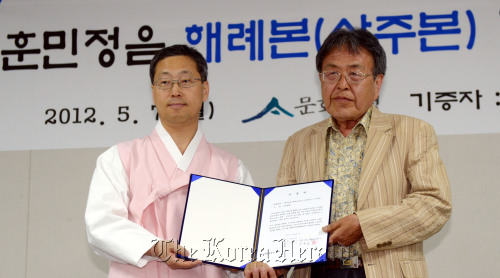Owner of missing relic transfers rights to the state
By Lee Woo-youngPublished : May 7, 2012 - 19:29
Experts question legitimacy of ownership on valuable text on Korean alphabet
The legal owner of the missing text of Korea’s writing system Hangeul handed over ownership to the government on Monday.
The state-run Cultural Heritage Administration said it hoped the ownership transfer could lead to a breakthrough in finding the missing piece as officials need to have the full rights to investigate without getting consent from the owner.
“I decided to donate my ownership of Hunminjeongeum to retrieve the missing piece as soon as possible so that it can be shared with all people of the country,” Jo said at the news conference on Monday.
“I feel very happy to give the ownership to the government,” he said.
The legal owner of the missing text of Korea’s writing system Hangeul handed over ownership to the government on Monday.
The state-run Cultural Heritage Administration said it hoped the ownership transfer could lead to a breakthrough in finding the missing piece as officials need to have the full rights to investigate without getting consent from the owner.
“I decided to donate my ownership of Hunminjeongeum to retrieve the missing piece as soon as possible so that it can be shared with all people of the country,” Jo said at the news conference on Monday.
“I feel very happy to give the ownership to the government,” he said.

The 15th century text “Hunminjeongeum Haeryebon Sangjubon” was stolen in 2008 by Bae Ik-gi from Jo and its whereabouts is still unknown.
Despite years of investigation, the cultural heritage agency has not been able to find the piece as Bae has not said a word about its location.
The text, estimated to be worth 1 trillion won ($878 million), is believed to be vacuum-packed and hidden near Bae’s residence, said Kang Shin-tae, director of heritage investigation division of Cultural Heritage Administration, refuting speculation that it has been sold overseas.
“I doubt the missing piece has been sold overseas as it requires Bae to have a really close connection in foreign countries. But Bae doesn’t have such connections as he has been preoccupied by years of ongoing lawsuits with Jo,” said Kang.
The state-run agency expects having the ownership will accelerate the discovery of the missing text.
It also believes it will pressure Bae to disclose the location of the missing text.
The missing text is believed to have been purchased by Jo from a looter surnamed Seo who robbed the text from Gwangheung Temple in Andong, North Gyeongsang Province. It was subsequently taken from Jo’s antique shop by Bae when he bought old books from the store.
During Monday’s news conference it was revealed that the text might not be from Gwangheung Temple and that Jo may not have bought it from a looter.
Jo claimed that the text had been in his family for generations and that the looter surnamed Seo is lying.
Experts at the news conference said that the chances are low that it had been stored in a structure at the temple.
“The text was not in good condition when I first got to look at it (through photos), it was oxidized, which is a result of exposure to outside air for a long time,” said Park Moon-yeol, a member of the cultural heritage committee of the Cultural Heritage Administration, and professor of Chongju University.
However, experts continued to raise questions about the legitimacy of Jo’s ownership since it was widely seen to have been obtained in an illegal way.
Ven. Beomjong from Gwangheung Temple claimed that the text belongs to his temple as the criminal court found that the text was originally from the temple.
“The criminal court ruled that the text was among a group of relics stored in a Buddha statue at the temple,” he said at a separate news conference at Jogye Temple in Jongno on Monday.
He stressed what should be the focus in this complex situation is not figuring out the authenticity or the ownership of the text, but to find it in good condition.
Hwang Pyeong-woo, director of Korea Cultural Heritage Policy Research Institute who has been closely following the case, also said: “It’s not right to see the Cultural Heritage Administration take over the ownership of the missing relic, which was probably stolen in the first place. It’s not right for the Jogye Order to claim its ownership too. What we need to focus on is to find the text first.”
By Lee Woo-young (wylee@heraldcorp.com)







![[Graphic News] More Koreans say they plan long-distance trips this year](http://res.heraldm.com/phpwas/restmb_idxmake.php?idx=644&simg=/content/image/2024/04/17/20240417050828_0.gif&u=)
![[KH Explains] Hyundai's full hybrid edge to pay off amid slow transition to pure EVs](http://res.heraldm.com/phpwas/restmb_idxmake.php?idx=644&simg=/content/image/2024/04/18/20240418050645_0.jpg&u=20240419100350)





![[From the Scene] Monks, Buddhists hail return of remains of Buddhas](http://res.heraldm.com/phpwas/restmb_idxmake.php?idx=652&simg=/content/image/2024/04/19/20240419050617_0.jpg&u=20240419175937)

![[KH Explains] Hyundai's full hybrid edge to pay off amid slow transition to pure EVs](http://res.heraldm.com/phpwas/restmb_idxmake.php?idx=652&simg=/content/image/2024/04/18/20240418050645_0.jpg&u=20240419100350)

![[Today’s K-pop] Illit drops debut single remix](http://res.heraldm.com/phpwas/restmb_idxmake.php?idx=642&simg=/content/image/2024/04/19/20240419050612_0.jpg&u=)